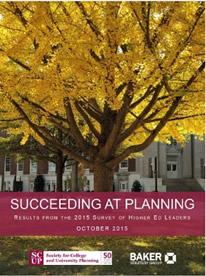Higher Education Leaders Agree That Good Planning Is Important But Most Don't Do It Well, Survey Reveals
 ANN ARBOR, MI – A survey on college and university planning revealed that higher education leaders agree that good planning is crucial to an institution's long-term success but there is also room for improvement, according to a recent survey by the Society for College and University Planning (SCUP), an international association that develops individual and organizational planning capacities for higher education.
ANN ARBOR, MI – A survey on college and university planning revealed that higher education leaders agree that good planning is crucial to an institution's long-term success but there is also room for improvement, according to a recent survey by the Society for College and University Planning (SCUP), an international association that develops individual and organizational planning capacities for higher education.
The survey results are available for free at www.scup.org/2015planningsurvey.
In June 2015, the society, with assistance from Ann Arbor-based Baker Strategy Group, emailed a survey to more than 94,000 higher education professionals in the United States. The survey asked about planning practices on the respondent’s campuses and their familiarity with the society.
The survey attracted responses from higher education leaders involved in academic and strategic planning as well as leaders active in other areas of institutional planning. Their input provided insights on what is and is not going well in planning across higher education institutions. Most respondents understood and agreed with the notion that good planning is an important contributor to the success of the institution but they gave their senior leadership failing grades when it came to planning.
Areas that go relatively well in the planning process on campus, according to the survey, include creating awareness of the need to plan and the planning process, incorporating feedback, identifying the right people to participate in the planning process, and producing a plan that can be implemented.
Areas of relative difficulty include using a common planning vocabulary, creating transparency, identifying resource strategies, and structuring planning documents.
“Integrated planning is critical in preparing for the future of higher education,” says Nicholas R. Santilli, chair of the SCUP Board of Directors and associate provost for accreditation & institutional effectiveness and professor of psychology at John Carroll University. “Higher education leaders must address complex challenges and envision new forms of collaboration. Good planning bears tremendous fruit, but it can be a difficult process to conduct and involves overcoming numerous challenges for successful execution. To succeed in planning, campus leaders should focus efforts on the areas that, if improved, would have the largest impact on overall planning success.”
The survey results also revealed seven factors that are closely related to overall success in planning for colleges and universities, including (1) emphasize planning and create a "culture of planning" on the campus, (2) provide training on planning, (3) define effectiveness, (4) integrate planning across the campus (or across multiple campuses), (5) agree on planning priorities, (6) be agile, and (7) manage change.
Not all roles at the institution have the same perspective on current planning effectiveness. Leaders engaged in broad campus planning have a higher view of their institution's planning, while those involved in academics and student services tend to have a lower view of overall planning at the institution. Respondents who spend more time on planning give higher ratings, suggesting that the integration of part-time planners is where the challenge lies.